
The Hungarian Socialist Party, commonly known by its acronym MSZP, is a centre-left to left-wing social-democratic and pro-European political party in Hungary.

The Democratic Coalition is a social democratic and social-liberal political party in Hungary led by former Prime Minister Ferenc Gyurcsány. Founded in 2010 as a faction within the Hungarian Socialist Party (MSZP), the Democratic Coalition split from the MSZP on 22 October 2011 and became a separate party. It has fifteen MPs in the National Assembly and two MEPs in the European Parliament.

Ferenc Gyurcsány is a Hungarian entrepreneur and politician who served as Prime Minister of Hungary from 2004 to 2009. Prior to that, he held the position of Minister of Youth Affairs and Sports between 2003 and 2004.

An election of Members of the European Parliament from Hungary to the European Parliament was held in 2009. Hungary delegated 22 members to the European Parliament based on the Nice treaty and the election took place on 7 June.

LMP – Hungary's Green Party is a green-liberal political party in Hungary. Founded in 2009, it was one of four parties to win seats in the National Assembly in the 2010 parliamentary election. It is a member of the Global Greens, and suspended member of the European Green Party.
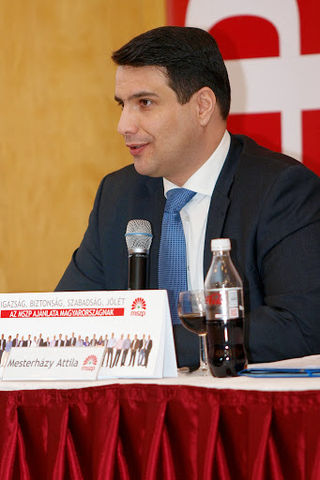
Attila Mesterházy is a Hungarian politician, who served as the seventh chairman of the Hungarian Socialist Party (MSZP) from 10 July 2010 to 29 May 2014. He was a Member of Parliament between 2004 and 2022. He was the party's candidate for the position of Prime Minister of Hungary in the 2010 and 2014 parliamentary elections.
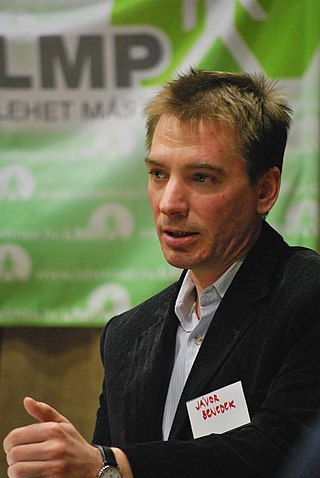
Benedek Jávor is a Hungarian politician and a former Member of the European Parliament (MEP) from 2014 to 2019. He is a member of Dialogue for Hungary, part of the European Green Party.

Csaba Molnár is a Hungarian politician and Member of the European Parliament (MEP). He is a member of the Democratic Coalition. He served as Minister of Transport, Communications and Energy in the second cabinet of Ferenc Gyurcsány, later as a Minister of the Prime Minister's Office in the government of Gordon Bajnai.

Gergely Szilveszter Karácsony is a Hungarian politician, political scientist and current Mayor of Budapest. He previously served as member of the National Assembly (MP) from 2010 to 2014 and Mayor of Zugló from 2014 to 2019.
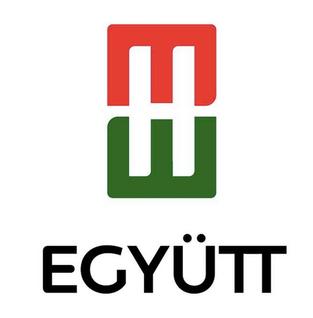
Together, officially Together – Party for a New Era, formerly also known as Together 2014, was a social-liberal political party in Hungary formed on 26 October 2012 for the 2014 Hungarian parliamentary election by Gordon Bajnai, the former Prime Minister of Hungary, to contest Viktor Orbán's government. Together was founded as a coalition of left-wing and liberal political movements and civil organizations that transformed itself into a party in March 2013.

Tímea Szabó is a Hungarian humanitarian worker, journalist and politician. She has been a member of the National Assembly (MP) since 2010 from the Politics Can Be Different (LMP) National List, and since the 2014 election as a member of Dialogue for Hungary (PM).
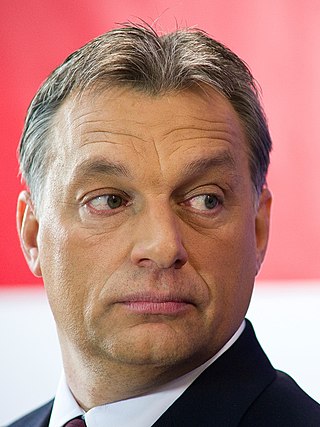
Parliamentary elections were held in Hungary on 6 April 2014. This parliamentary election was the 7th since the 1990 first multi-party election. The result was a victory for the Fidesz–KDNP alliance, preserving its two-thirds majority, with Viktor Orbán remaining Prime Minister. It was the first election under the new Constitution of Hungary which came into force on 1 January 2012. The new electoral law also entered into force that day. For the first time since Hungary's transition to democracy, the election had a single round. The voters elected 199 MPs instead of the previous 386 lawmakers.

Viktor Szigetvári is a Hungarian politician, political scientist and campaign strategist, who served as leader of the Együtt party from 2013 to 2017.

A referendum related to the European Union's migrant relocation plans was held in Hungary on 2 October 2016. The referendum was initiated by the government, under the provision of article 8 of the new constitution of 2012. It was commonly referred to as the kvótanépszavazás or kvótareferendum in the Hungarian media.

Péter Juhász is a Hungarian telemarketer, cannabis activist and politician, who served as leader of the Együtt party from February 2017 until its dissolution.
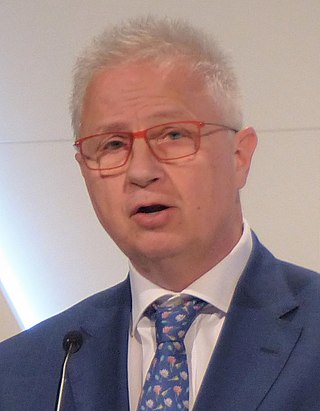
An election of Members of the European Parliament from Hungary to the European Parliament was held on 26 May 2019, electing the 21 members of the Hungary delegation to the European Parliament as part of the European elections held across the European Union.

An opposition primary was held in Hungary, between 18–28 September 2021 and 10–16 October 2021, to select the candidate for Prime Minister of Hungary supported by the opposition parties to form a coalition to compete in the 2022 parliamentary election. It was the first countrywide primary election in the political history of Hungary. The parties had also selected common candidates for single-member districts via the primary.
United for Hungary was a big tent political alliance in Hungary that was formed to compete in the 2022 parliamentary election. The alliance lost the 2022 election, and dissolved shortly after.

László Varju is a Hungarian politician and mining engineer. He has been a member of the National Assembly of Hungary since 2002. He served as Secretary of State for National Development and Economy from 2008 to 2010.























